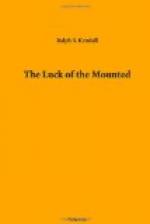Throughout the day Gully had remained in a sort of sullen, brooding stupor. But now, with the coming of night, he seemed to grow restless—pacing within the narrow confines of his cell like unto a trapped wolf, his leg-shackles clanking at every turn. Seated outside the barred door, McSporran maintained a close and vigilant guard. It wanted four hours yet until train time and inside the living-room the inspector, Slavin, and Yorke were beguiling the interval in low-voiced conversation.
“Strange thing, Sergeant,” remarked Kilbride musingly, “I can’t place him now, but I’ll swear I’ve seen this man, Gully, before; somewhere back of beyond, I guess. I’ve been in some queer holes and corners on this globe in my time—long before I ever took on the Force. Seems he has, too, from what you and Yorke have told me. D——d strange! . . . I’ve got a fairly good memory for faces but—”
He broke off and looked enquiringly at McSporran, who had silently entered just then. “What is it, McSporran?”
“Gully, Sirr!” responded the constable, saluting. “He wad wish tu speak wi’ ye, Sirr.”
The inspector’s face hardened, and his steely eyes glittered strangely as he heard the news. For a brief space he remained, chin in hand, in deep thought; then rising, he sauntered slowly over to the prisoner’s cell.
“What is it you want, Gully?” he said quietly.
“Kilbride—Inspector!” came the great rumbling bass through the bars. “If you keep me cooped up in this pen much longer . . . I tell you! . . . you’ll have me slinging loose in the head—altogether!” He uttered a mirthless, wolf-like bark of a laugh. “My ears are keener than your memory—I heard you speaking just now. Listen!—” a curiously wistful note crept into his deep tones, for the inspector had made an angry, impatient gesture—“Listen, Kilbride! . . . I’m gone up—I know it—therefore, if I sing my ‘swan song’ now or later, it can matter little one way or the other; and I would rather sing it to you and Slavin and Yorke there than to anyone else. Before I am through, you all may—shall we say—p’raps judge me a trifle less harshly than you do now. Regard this as . . . practically the last request of a man who is as good as dying . . . that—I be allowed to sit amongst you once more . . . and talk, and talk, and ta—”
His voice broke, and he left the sentence unfinished. For some few seconds the inspector remained motionless, with bent head, just looking—and looking—in deep, reflective silence at the doomed man who importuned him.
“Am I to understand that you wish to make a statement, Gully?” he said, in even, passionless tones. “Remember!—you’ve been charged and warned, man—whatever you say’ll be used in evidence against you at your trial.”
The other, hesitating a moment, swallowed nervously in his agitation.
“Yes,” he said huskily, “I know—but that’s all right! . . . As I said before—it can make little or no difference . . . in my case. . . .”




